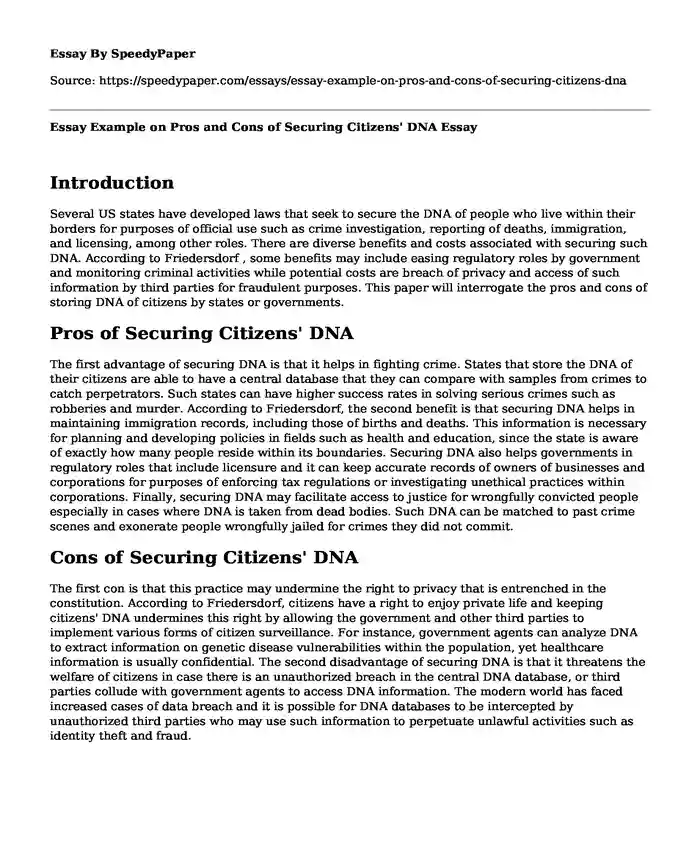
| Type of paper: | Essay |
| Categories: | Genetics Security Public administration |
| Pages: | 3 |
| Wordcount: | 584 words |
Introduction
Several US states have developed laws that seek to secure the DNA of people who live within their borders for purposes of official use such as crime investigation, reporting of deaths, immigration, and licensing, among other roles. There are diverse benefits and costs associated with securing such DNA. According to Friedersdorf , some benefits may include easing regulatory roles by government and monitoring criminal activities while potential costs are breach of privacy and access of such information by third parties for fraudulent purposes. This paper will interrogate the pros and cons of storing DNA of citizens by states or governments.
Pros of Securing Citizens' DNA
The first advantage of securing DNA is that it helps in fighting crime. States that store the DNA of their citizens are able to have a central database that they can compare with samples from crimes to catch perpetrators. Such states can have higher success rates in solving serious crimes such as robberies and murder. According to Friedersdorf, the second benefit is that securing DNA helps in maintaining immigration records, including those of births and deaths. This information is necessary for planning and developing policies in fields such as health and education, since the state is aware of exactly how many people reside within its boundaries. Securing DNA also helps governments in regulatory roles that include licensure and it can keep accurate records of owners of businesses and corporations for purposes of enforcing tax regulations or investigating unethical practices within corporations. Finally, securing DNA may facilitate access to justice for wrongfully convicted people especially in cases where DNA is taken from dead bodies. Such DNA can be matched to past crime scenes and exonerate people wrongfully jailed for crimes they did not commit.
Cons of Securing Citizens' DNA
The first con is that this practice may undermine the right to privacy that is entrenched in the constitution. According to Friedersdorf, citizens have a right to enjoy private life and keeping citizens' DNA undermines this right by allowing the government and other third parties to implement various forms of citizen surveillance. For instance, government agents can analyze DNA to extract information on genetic disease vulnerabilities within the population, yet healthcare information is usually confidential. The second disadvantage of securing DNA is that it threatens the welfare of citizens in case there is an unauthorized breach in the central DNA database, or third parties collude with government agents to access DNA information. The modern world has faced increased cases of data breach and it is possible for DNA databases to be intercepted by unauthorized third parties who may use such information to perpetuate unlawful activities such as identity theft and fraud.
Conclusion
There are diverse pros and cons of securing DNA of citizens by states and the national government. Some of the pros include enhancing access to justice, improving crime investigation, and enhancing planning and regulation. Some of the pros include undermining the right to privacy and the risks associated with unauthorized data breach. Even though there are tremendous benefits of securing DNA of its citizenry, states should consider the numerous risks and costs of the same, so that they can implement this policy in a manner that mitigates its cons. Moreover, it is beneficial to store DNA data on citizens since it enhances the government's role of regulating the population, enhancing service delivery, and improving the welfare of all citizens.
Work Cited
Friedersdorf Conor. The Dangers of a Mandatory DNA Database. Retrieved from https://www.theatlantic.com/ideas/archive/2019/02/dna-arizona/583120/, 2019
Cite this page
Essay Example on Pros and Cons of Securing Citizens' DNA. (2022, Dec 26). Retrieved from https://speedypaper.com/essays/essay-example-on-pros-and-cons-of-securing-citizens-dna
Request Removal
If you are the original author of this essay and no longer wish to have it published on the SpeedyPaper website, please click below to request its removal:
- Tourism Essay Sample about Camps Bay, Western Cape Coast
- Free Essay: Brands and Their Effects on Children's Development
- An essay Example on Child Psychology
- Crisis in Criminal Justice System - Free Essay for Everyone
- Free Essay: Political, Social and Cultural Environment of Organized Crime in the US and the UK
- Missed Nurse Care by Beatrice J. Kalisch, PhD, RN, FAAN
- Case Analysis for KeurigKeurig overview
Popular categories




